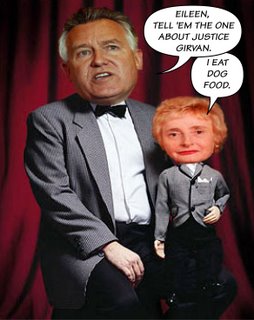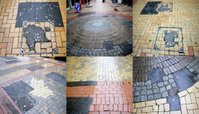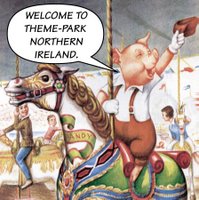
The Castleward Book Fair didn't advertise itself as an event where one had to pay admittance.
I pointed this out to the apologetic, elderly gentleman from the National Trust who greeted me as I arrived. He was embarrassed enough to forego the usual £3.80 per person entrancee fee and instead let me in for £1.80 - the child's fare.
Although charmed by his generous gesture, I was still somewhat disgruntled at having to pay anything into an event where I was expected to buy books, especially as the 18th Century mansion was closed to the public.
Anyway, the books were cheap and in plentiful supply. Colour stickers marked the £3 bargins from the £1 bargains and I even managed to get a copy of Ladybird's classic 'Downey Duckling' for 10p. I made my way to the pay point where elderly ladies with fixed grins and cut-glass accents rifled through the flyleaves in search of prices. I contested this attempt at flyness by pointing out the blue stickers on the spines of the books, denoting the price as £1 per book. The ladies gasped in humble apology and directed me to the bookshop next door, which I was informed held similarly priced goodies.
In the bookshop, a female customer, hobbling on a crutch, was in dialogue with another woman and a man, both of whom appeared to work in the shop. The women were dressed in tweeds and seemed to have modelled their appearances on Queen Elizabeth II. They held fixed-grin expressions and spoke with the most affected upper-class accents I've ever heard. As I made a play of browsing the shelves, I strained to ascertain the geographical location of said accents, but the feat was rendered impossible as the women's voices seemed to duel with one another to see who could sounded most royal. There was no geographical source for these voices. The entire performance was couched in crude snobbery. Irony was entirely absent.
"I wonder if you would suggest some light reading for me?" the woman with the crutch asked of the other woman. Her tone suggested she was more used to giving orders to servants.
"Why, I wouldn't know what kind of books you would like," answered the female shop assistant.
"I just need some light reading to send me to sleep," whittered the customer, ignoring the subtle protest of the other woman. "As long as it doesn't have any swear words. They're everywhere these days. It makes everything simply trying."
"One can't even go to the cinema," interjected the man, similarly accented. "It's wall to wall swear words. One for effect might be acceptable, but it's just wall to wall."
"It's dreadful," lamented the woman with the crutch, her tweed shifting uncomfortably.
"Oh look, there's one you might like," relented the female shop assistant. "'Sophie's World.'" She turned the book over and made a pretence of reading the back cover. "But who is Sophie?"
"I really need some light reading for when I get up in the night," the customer said. "We've mostly got biographies and such at home and I usually lose interest after a few chapters. I just get fed up. I really need some light reading."
"There's one. Hemmingway?"
"No."
"What about Barbara Taylor Bradford? 'Voice of the Heart'?"
"No."
"Joanna Trollope?" offered the shop assistant, examining another book, a pained expression creeping into her carefully maintained mask. "'Brother and Sister?'"
"No," the reply came, delivered in a bored tone.
"Oh, there's Dirk Bogarde."
"No."
"Oh, now look at that one," came the riposte. The shop asistant reached for a volume about the British Royal Family. She opened the pages and allowed her features to relax into quiet supplication. One would swear that sunlight poured from the photographs printed within as the general mood of the exchange improved considerably.
"Now, isn't that awfully telling," she said, pointing to a photograph. "That was taken just before they split up." She turned the book over. "It's by Jennie Bond."
"Didn't they get rid of her?" asked the woman with the crutch.
"Oh, yes," the other woman giggled. "They got rid of her, didn't they?"
"Oh, yes. They got rid of her."
"Oh, look. Kate Adie!" cried the shop woman, retreiving another book. "Philip and I are terribly impressed by her. Terribly impresed. You know, I said to my daughter, 'What do you want to do when you grow up?' and she siad, 'I want Kate Adie's job.' We're terribly impressed."
"Yes," came the reply. "It's not really light reading though, is it?"
"No, perhaps not," the shop woman said, disappointed at the rejection. She looked around at the books surrounding her, a vacant expresion on her face.
"Ronnie!" she cried. "Where's Ronnie?"
Enter Ronnie stage left.
"Here he is," purred the shop woman. "I call and angels descend." She flashed a row of pointed teeth at the other woman, who absently poked a nearby box of books with her crutch.
I wondered if I should intrude and ask the woman if she would mind picking out some books for me. I relented and left the claustrophobic shop.
I got into the car and turned on the radio. Radio Ulster was playing archive audio footage of the opening of Belfast's Queen Elizabeth Bridge on 4 July 1966 by Queen Elizabeth II. The shipyard workers - explained the plum-voiced announcer - were arranged on a floating pontoon, bedecked with red, white and blue bunting. Flags waved gaily. Queen Elizabeth II "very graciously" opened the bridge. She smiled and waved at the onlookers. The crowd cheered.
 Local ventriloquist doll and Speaker of the Northern Ireland Assembly, Eileen Bell, has accomplished a feat that would have previously seemed impossible. She has ensured Ian Paisley's "No," actually means "Yes."
Local ventriloquist doll and Speaker of the Northern Ireland Assembly, Eileen Bell, has accomplished a feat that would have previously seemed impossible. She has ensured Ian Paisley's "No," actually means "Yes."



